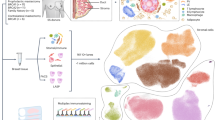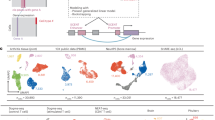Abstract
To date, more than 300 distinct small deletions, insertions and point mutations, mostly leading to premature termination of translation1, have been reported in the breast/ovarian-cancer susceptibility gene BRCA1. The elevated frequencies of some mutations in certain ethnic subpopulations2–4 are caused by founder effects5,6, rather than by mutation hotspots. Here we report that the currently available mutation spectrum of BRCA1 has been biased by PCR-based mutation-screening methods, such as SSCP, the protein truncation test (PTT) and direct sequencing, using genomic DMA as template. Three large genomic deletions that are not detected by these approaches comprise 36% of all BRCA1 mutations found in Dutch breast-cancer families to date. A 510-bp Alu-mediated deletion comprising exon 22 was found in 8 of 170 breast-cancer families recruited for research purposes and in 6 of 49 probands referred to the Amsterdam Family Cancer Clinic for genetic counselling. In addition, a 3,835-bp Alu-mediated deletion encompassing exon 13 was detected in 6 of the 170 research families, while an deletion of approximately 14 kb was detected in a single family. Haplotype analyses indicated that each recurrent deletion had a single common ancestor.
This is a preview of subscription content, access via your institution
Access options
Subscribe to this journal
Receive 12 print issues and online access
$209.00 per year
only $17.42 per issue
Buy this article
- Purchase on Springer Link
- Instant access to full article PDF
Prices may be subject to local taxes which are calculated during checkout
Similar content being viewed by others
References
Couch, F.J. et al. Mutations and polymorphisms in the familial early onset breast cancer (BRCA1). gene. Hum. Mutat. 8, 8–18 (1996).
Roa, B.B., Boyd, A.A., Volcik, K. & Richards, C.S., Jewish population frequencies for common mutations in BRCA1 and BRCA2. Nature Genet. 14, 185–187 (1996).
Caligo, M.A. et al. BRCA1 germline mutational spectrum in Italian families from Tuscany: a high frequency of novel mutations. Oncogene. 13, 1483–1488 (1996).
Peelen, T. et al. A high proportion of novel mutations in BRCA1 with strong founder effects among Dutch and Belgian hereditary breast and ovarian cancer families. Am. J. Hum. Genet. 60, 1041–1049 (1997).
Neuhausen, S.L. et al. Haplotype and phenotype analysis of six recurrent BRCA1 mutations in 61 families: results of an international study. Am. J. Hum. Genet. 58, 271–280 (1996).
Szabo, C.I. & King, M.-C. Population genetics of BRCA1 and BRCA2. Am. J. Hum. Genet. 60, 1013–1020 (1997).
Hogervorst, F.B.L. et al. Rapid detection of BRCA1 mutations by the protein truncation test. Nature Genet. 10, 208–212 (1995).
Peelen, T. et al. The majority of 22 Dutch high-risk breast cancer families are due to either BRCA1 or BRCA2. Eur. J. Hum. Genet. 4, 225–230 (1996).
Shapiro, M.B. & Senapathy, P. RNA splice junctions of different classes of eukaryotes: sequence statistics and functional implications in gene expression. Nucleic Acids Res. 15, 7155–7174 (1997).
Smith, T.M. et al. Complete genomic sequence and analysis of 117 kb of human DNA containing the gene BRCA1. Genome Res. 6, 1029–1049 (1996).
Rudiger, N.S., Gregersen, N. & Kielland-Brandt, M.C. One short well conserved region of Alu-sequences is involved in human gene rearrangements and has homology with prokaryotic chi. Nucleic Acids Res. 23, 256–260 (1995).
Puget, N. et al. A 1-kb Alu-mediated germ-line deletion removing BRCA1 exon 17. Cancer Res. 57, 828–831 (1997).
Szabo, C.I. & King, M.-C. Inherited breast and ovarian cancer. Hum. Mol. Genet. 4, 1811–1817 (1995).
Futreal, P.A. et al. BRCA1 mutations in primary breast and ovarian carcinomas. Science. 266, 120–122 (1994).
Katagiri, T. et al. Mutations in the BRCA1 gene in Japanese breast cancer patients. Hum. Mutat. 7, 334–339 (1996).
Easton, D., Bishop, D., Ford, D., Crockford, G. & & the Breast Cancer Linkage Consortium. Genetic linkage analysis in familial breast and ovarian cancer: results from 214 families. Am. J. Hum. Genet. 52, 678–701 (1993).
Narod, S. et al. An evaluation of genetic heterogeneity in 145 breast-ovarian cancer families. Am. J. Hum. Genet. 56, 254–264 (1995).
Cast ilia, L . et al. Mutations in the BRCA1 gene in families with early-onset breast and ovarian cancer. Nature Genet. 8, 387–391 (1994).
Inoue, R. et al. Germline mutation of BRCA1 in Japanese breast cancer families. Cancer Res. 55, 3521–3524 (1995).
Durocher, F. et al. Mutation analysis of the BRCA1 gene in 23 families with cases of cancer of the breast, ovary, and multiple other sites. J. Med. Genet. 33, 814–819 (1996).
Xu, C.F. et al. Mutations and alternative splicing of the BRCA1 gene in UK breast/ovarian cancer families. Genes Chrom. Cancer. 18, 102–110 (1997).
Hamann, U., Brauch, H., Garvin, A.M., Bastert, G. & Scott, R.J. German family study on hereditary breast and/or ovarian cancer: germline mutation analysis of the BRCA1 gene. Genes Chrom. Cancer. 18, 126–132 (1997).
Shattuck-Eidens, D. et al. A collaborative survey of 80 mutations in the BRCA1 breast and ovarian cancer susceptibility gene: implications for presymptomatic testing and screening. JAMA 273, 535–541 (1995).
Devilee, P. et al. At least four different chromosomal regions are involved in loss of heterozygosity in human breast carcinoma. Genomics. 5, 554–560 (1989).
Friedman, L. et al. Confirmation of BRCA1 by analysis of germline mutations linked to breast and ovarian cancer in ten families. Nature Genet. 8, 399–404 (1994).
Author information
Authors and Affiliations
Corresponding author
Rights and permissions
About this article
Cite this article
Petrij-Bosch, A., Peelen, T., van Vliet, M. et al. BRCA1 genomic deletions are major founder mutations in Dutch breast cancer patients. Nat Genet 17, 341–345 (1997). https://doi.org/10.1038/ng1197-341
Received:
Accepted:
Issue Date:
DOI: https://doi.org/10.1038/ng1197-341
This article is cited by
-
Long-term outcomes of young, node-negative, chemotherapy-naïve, triple-negative breast cancer patients according to BRCA1 status
BMC Medicine (2024)
-
E2F1 copy number variations in germline and breast cancer: a retrospective study of 222 Italian women
Molecular Medicine (2021)
-
DNA nanomapping using CRISPR-Cas9 as a programmable nanoparticle
Nature Communications (2017)
-
Spectrum of genetic variants of BRCA1 and BRCA2 in a German single center study
Archives of Gynecology and Obstetrics (2017)
-
Contribution of BRCA1 large genomic rearrangements to early-onset and familial breast/ovarian cancer in Pakistan
Breast Cancer Research and Treatment (2017)



